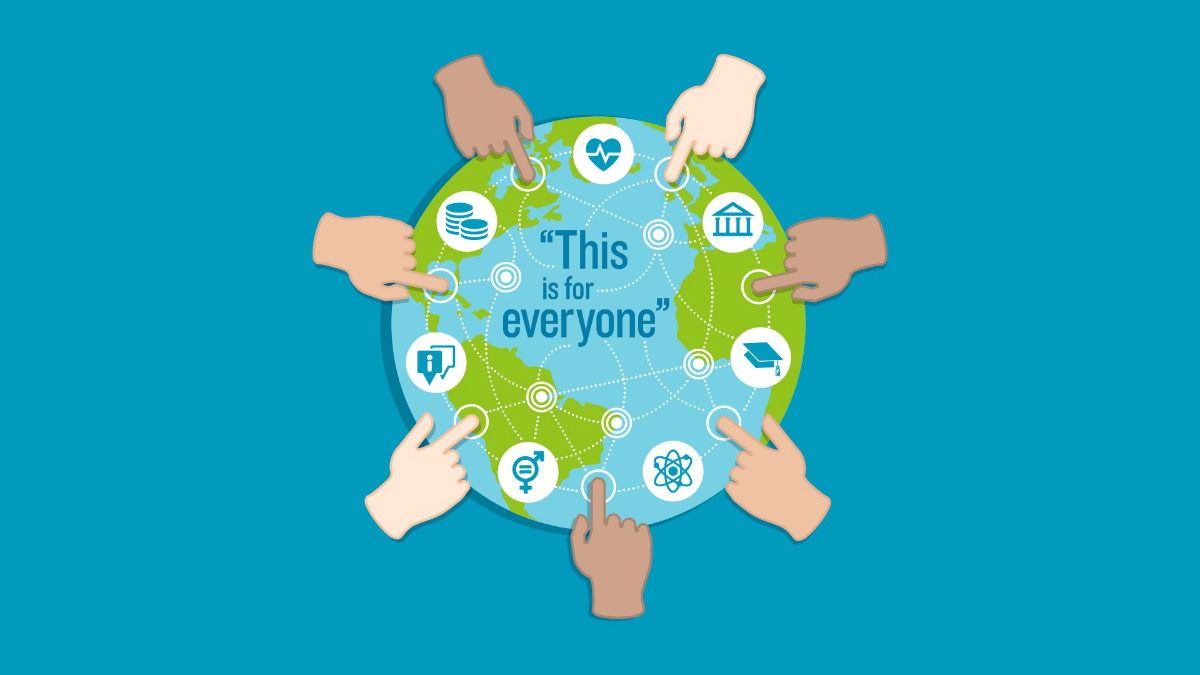 This article was originally posted on the Web Foundation’s website. You can view it here.
This article was originally posted on the Web Foundation’s website. You can view it here.
Our Focus
“This is for everyone.”
This simple message is what Sir Tim Berners-Lee — the inventor of the web, and founding director of the Web Foundation — shared with 900 million people during the opening ceremony of the London 2012 Olympics. It reflects the web’s past — in particular, Sir Tim’s decision to gift his invention to the world for free. More importantly, it summarises his hopes and desires for humanity’s future — that the web and other related technologies become equalising forces that benefit all of us.
True to this vision, the Web Foundation has chosen to focus our 2017 – 2022 strategy on delivering ‘digital equality’ — using the open web to build a more equal world. Why? Because despite the wave of creativity, innovation and collaboration unleashed by the web, the reality is that today, the web is not for everyone. In fact, the digital revolution is creating new patterns of privilege and discrimination. It is causing job losses and wage polarisation as well as productivity gains; it risks taking away our privacy and autonomy even as it gives ordinary citizens new powers; it is isolating us in filter bubbles as well as connecting us across borders; and it is amplifying voices of fear and hate just as much as voices for tolerance and rationality.
We must act now to close the divide between digital haves and have-nots or we risk losing the web’s potential to serve humanity forever. To do this, we must work harder to ensure that everyone has the access, skills, and freedoms to appropriate and control new technologies for their own benefit. We must also make sure that control of the web is not held by a few governments or companies.
Our Approach
Of course, this is a huge challenge. So how will we advance this on a practical level? By playing to our strengths, namely our respected original research, our diverse international team, our ability to bring many actors together to build consensus, and our capability to use our voice — and that of Sir Tim — to focus attention on the most important issues. For the next five years, we’ll use these strengths to double down our focus on policy advocacy — pushing for shifts in government and corporate policies and actions, working closely with partners and allies wherever possible. While the landscape is ever-shifting, priority policy areas will include affordable access, gender equality, net neutrality, open data, online privacy and the impact of algorithmic decision-making. We’ll work globally, but will continue to have a particular focus on countries in the Global South.
Our Goals
We are targeting wins in three specific areas:
1) Power: All People Can Make Their Voices Heard Equally
We will fight to ensure people’s rights on the web are legally protected. This means enshrining in law your right to freedom of expression and privacy online and ensuring that you have control over the collection and use of your personal data.
We will also push for policies that encourage a greater diversity of voices and content online. This means ensuring that the rights of women and excluded groups to participate in online life without harassment, intimidation or surveillance are protected, and that strong, clear net neutrality policies are in place that enable independent websites and small start-ups to thrive.
2) Accountability: Citizens Hold Governments and Companies to Account
We will continue to push for policies that open up key information online, and equip public interest groups to use this data to hold governments and companies accountable.
We also want to see stronger transparency and accountability in the use of digital resources and tools such as computer models (algorithms) that help determine the information and opportunities available to citizens. Hand in hand with this, we will continue to push for responsible policies around the collection and use of personal data by governments and companies.
3) Opportunity: Women and Other Excluded Groups Gain Economic and Social Opportunities and Resources
Digital equality means more inclusive public services and fair opportunities in the digital economy. Examples of policy outcomes we will be pursuing here are affordable broadband for all; expanded and enhanced free public WiFi schemes and digital skills programmes; and increased financial inclusion for women through digital financial services
The road ahead
The goals we’ve set are ambitious, but now more than ever we must be bold and challenge the interests that would seek to limit, control and fragment the free and open web. We will work to improve internet and technology policy at the national, regional and global level and measure our success not only by the number of new web users who come online but also by the number of web users who enjoy protections of their digital rights.
We will need strong partners and dedicated web champions fighting alongside us around the world. In the past three years, we’ve been fortunate to work with over 150 incredible organisations from over 50 countries. Collaboration and working in coalition will become even more central to our work in the years ahead.
We’d love to hear your feedback on our plans, and learn more about how you’re supporting the free and open web for everyone. Please leave a message in the comments below, send us an email to contact@webfoundation.org, or tweet us @webfoundation.
Leave a Reply